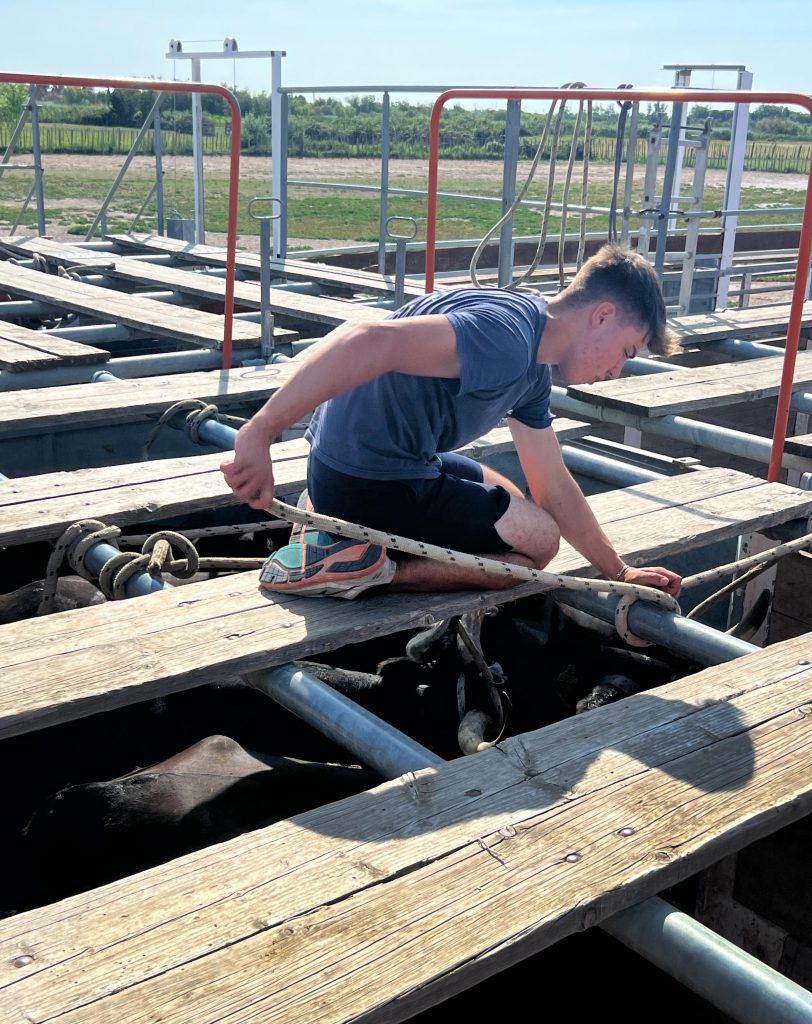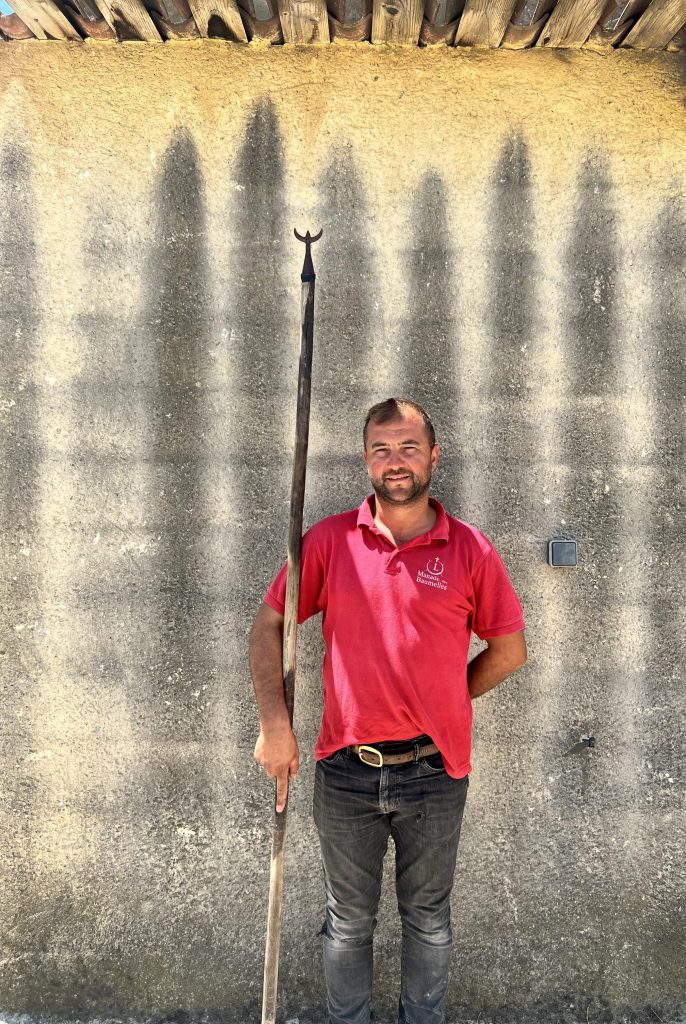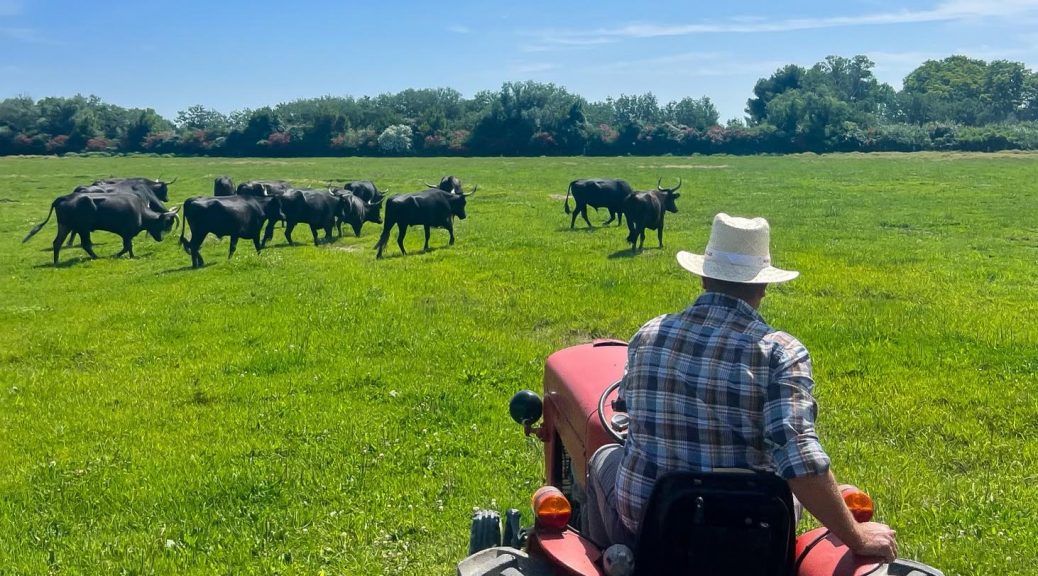Story and photos by Alexie Zollinger
At the Manade des Baumelles in the Camargue region of the South of France, the sound of cowbells clanking breaks up the numbing noise from the cicadas, and distant exclamations can be heard coming from two employees. The hollers are tracked to two men, the older one giving instructions to the younger, who is hard at work, with irritated mosquito bites covering his legs from long days in the marshy wetlands of the region.
The men step between slim planks of wood about a foot wide, laid across a corral holding three large Camargue bulls, idolized in the region due to their importance in traditional bullfighting and bull games. The men take turns carrying large double braided ropes through the slats, leaning their bodies back in order to apply the weight needed to lead the hefty animals beneath. They explain they are trying to attach a label to the ears of the bulls as a way to recognize bulls of their herd before the main event; they will run the bulls through the region on horseback, a well known and popular tradition in the Camargue.

Since the 16th century, the Camargue has been at the roots of established traditions in the region. With 360 square miles of sprawling farm land, its primary economic function, up until about 50 years ago, was as pasture for white Camargue horses, and breeding grounds and caring for bulls for the purpose of bullfighting and bull games. Now, the jobs of the Camargue’s inhabitants have changed– in addition to herding bulls, they are also herding tourists.
The Camargue is Western Europe’s largest river delta. In it lie 150 manades or ranches, dedicated to the raising and care of Camargue bulls and horses. The Camargue has often been called the “wild west of France,” with the manadiers its ranchers and the gardians its cowboys.
When the Camargue traditions started, these modern-day heroes were no more than agricultural laborers, and many of the inhabitants of the Camargue lived in poverty. It wasn’t until the late 19th century that nobleman Marquis de Baroncelli, infatuated with the Camargue’s beautiful scenery and inspired by the gardians‘ dedication to the land, swore to elevate these men, and promote them as protectors of the land. This status remains intact today – but many aspects of these traditions have changed.
Throughout history, and up until about 50 years ago, gardians lived in the Camargue in traditional cabanes de gardian, small whitewashed homes made from materials often found in the Camargue – walls made from mud and stone, roofs made from reeds and sewn together with iron-weaved thread, and topped with limestone at the point. The homes are very small, with only one room and an open air fireplace for warmth and a small living space. Now, these homes are almost all renovated or built new, and listed as vacation rentals and Airbnbs, for upwards of $200/night in peak tourism season.
The biggest building on any manade would have housed the manadier and his family in the 19th century, and would be made of stone. Now, they primarily serve as reception areas or small hotels for tourists, who visit the Camargue to see the legendary black bulls and white horses, and learn about the origins of bull games and bull fighting.
Due to this popularity, the job descriptions have changed for the gardians and manadiers. They often give informational tours of the manade to tourists, and manadiers also become hotel managers, balancing tourist bookings with the traditional practice of raising and caring for the vital heart of the manade–the actual livestock.

The Manade des Baumelles is a renovated manade complete with a hotel and two restaurants on the property. The manade offers horseback riding, tractor tours and other Camargue excursions.
The relationship is intertwined now, and everyone who is involved in the traditions of the Camargue has been forced to adapt to these changes over time. They have found that one cannot exist without the other. Emile Astruc, an employee in the manade, said, “Without tourism there is not enough money coming in to have the Camargue or the gardians or the hotel; everything does go to the Camargue.”
Astruc believes all of the employees in the manades of the Camargue, whether they have an agricultural job or a job in hospitality, work in the manade because they are passionate about the traditions. She herself drives over an hour and a half from her home near Marseille every day at 6 a.m. to be in this position.
Faure is the sole employed gardian of the Manade des Baumelles, and has been working in the Camargue professionally for six years. As a child he devoted much of his time to volunteering, as the traditions of the land are his passion.
Similarly to Astruc, Faure says that his career is a labor of love. “We don’t think about [it as a] job. I know that I work and that makes it my job, but it’s a passion because it’s never the same, because you see a lot of different things and because it’s pleasant.”
He says he is grateful for the increase in tourism, because it is thanks to tourists that he can keep his traditions alive, even if they have changed. Through tourism, Faure can continue to educate the public on the history and traditions of the Camargue. In modern times, in the face of so much opposition to bull activities, Faure believes tourism helps spread the defense of the practices.
“It’s scary,” Faure said. “It is true that today there are people who are fighting to have all that abolished. And it’s true that likewise, if that were to be the case, we wouldn’t work anymore and there wouldn’t be any point in raising bulls.It is important to preserve working with a wild animal in the wild and to make a difference, and to perpetuate the traditions around the horse and the bull.”
Faure said his hope is for “traditions [to] continue… and to manage to make people understand that this must continue, that [bull] breeding is made to make this show and that we should not fight against [it.]
Roles have adapted to incorporate tourists, but it is through tourist dollars that the traditions are intact, and it is through educating tourists that the traditions can continue to be celebrated, said Faure.
“It’s not just a story of money,” said Faure. “No, tourism is also important to share our culture.”

